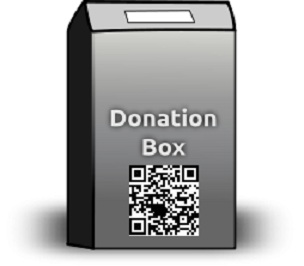 Smartphone users have a wealth of information available to them by scanning QR codes on products and in advertisements, and will now be able to make charitable donations through the same format.
Smartphone users have a wealth of information available to them by scanning QR codes on products and in advertisements, and will now be able to make charitable donations through the same format.
QR codes to aid 6,000 charities
The start-up Paystik has launched a campaign to raise charitable donations for over 6,000 charities using the QR code as a means to make quick and easy payments when consumers wish to donate to a charity of their choosing. The goal is to use QR codes for easy payments to both charities and small businesses. Both can sign on with Paystik to produce QR codes, thus reducing problems with billing and advertising.
The result will be an app for smartphones, allowing consumers to send quick and easy payments. Project C.U.R.E. will begin a campaign this week with direct mail. Last year, this organization reached out to consumers for charitable donations over the holidays and supplied over $40 million in medical care and supplies around the world. This campaign will be aimed at merchants this year.
QR codes gaining in US
The US has been a hard sell for mainstream use of QR code for payments. Companies like Paypal, DigiMo, Qriket, and Doxo have been accepting payments through QR, though none have become a huge success in that category. It is thought that smartphone saturation in the US could see a change in that regard, with smartphone use steadily on the rise. Still, a QR code is often a hard sell in the US. Some consumers are still not sure what their purpose is and are not aware of how to use the technology.
Co-founder James Ioannidis said, “Obviously, the first time is the hardest. But after on-boarding them, we see consumers making repeat transactions.” He went on to explain that he feels aiding charities will bring Paystik success where other campaigns featuring QR code have faltered. The biggest obstacle is getting the consumer aware of the code and to also download the app.
About Paystik
The company of New Stanford is a three-person operation based in Stanford Venture Studio at the Graduate School of Business. At the present time, the company is bootstrapped, meaning they have no outside investment. Ioannidis is a former program manager with Microsoft.

